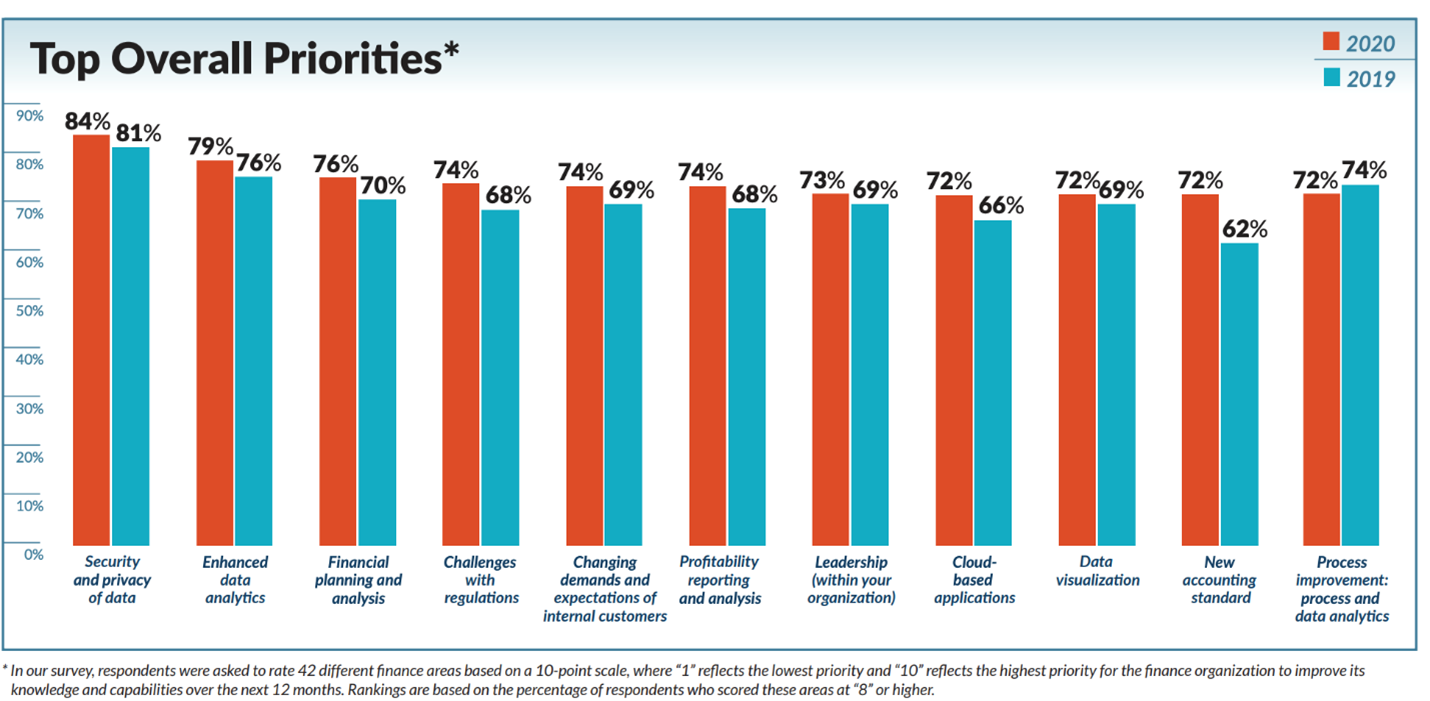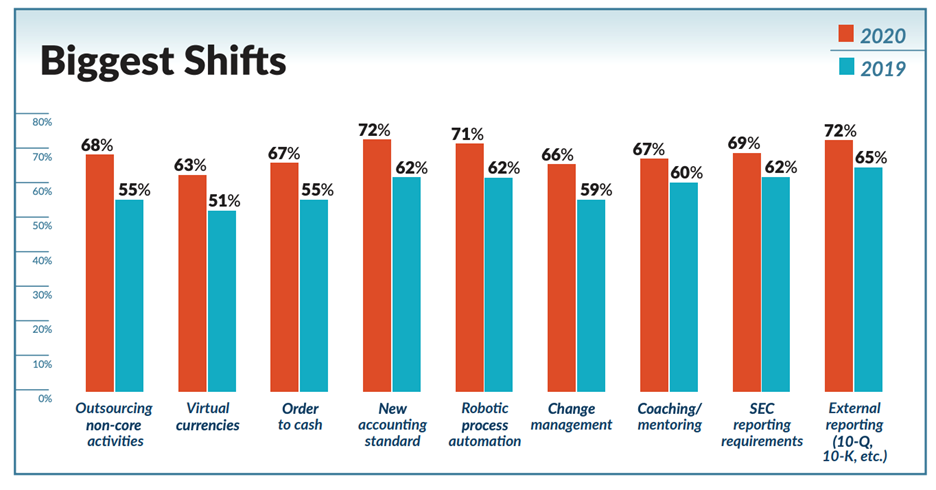Digital transformation and the migration of critical systems to the cloud were underway long before COVID-19 forced companies to quickly convert to a remote work footing in early 2020. The global pandemic, however, provided an imperative for companies to accelerate their plans. That shift, or “tech-celeration,” provides important context in which to analyze the answers of respondents from organizations running SAP in the latest Protiviti Finance Trends Survey.
The two highest priorities on this year’s survey, “Security and Privacy of Data” and “Enhanced Data Analytics,” have been top concerns for tech leaders over the past several years, as an increase in the availability of data and increasing regulatory and customer focus on data security and privacy have required an increased investment in those areas. But each of the top 10 priorities can be tied, at least tangentially, to these two themes.
What’s Hot Now
In today’s altered work environment, where more people are working virtually or working from home and transacting business over new and varied remote networks, a greater focus is on the security and privacy of data in the cloud. And with more data available (and particularly more core data), it is not surprising that companies are looking for new ways to analyze that information and use it to their strategic advantage and to make data driven decisions.
Companies want information to be more easily accessible and available in real-time. There has been a trend in this direction for financial reporting in general (balance sheet, profit and loss, etc.). In 2020, however, CFOs were much more focused on cash flow — and not just cash flow overall, but free or expendable cash. This point was driven home during the middle of 2020, when businesses were shut down and cash became scarce. CFOs were monitoring their cash position on a day-to-day basis.

In one way or another, virtually all of the top 10 priorities for SAP respondents can be attributed to data or cash, with analytic concerns being driven by the desire for better transparency into the order-to-cash cycle, supply chains and regulatory worries related to how governing bodies will respond to digital transformation. This is especially true in highly regulated industries, including financial services and healthcare. For example, there was much concern among CFOs regarding new accounting standards that were coming into effect in the middle of 2020 and whether regulators would defer compliance in light of pandemic-related disruption.
What’s Changing
The cloud migration in finance began more than a decade ago with the question of whether some core processes, many of which were being performed manually or with minimal automation on-premise, might be performed virtually in the cloud using a shared ERP solution such as SAPS/4HANA. As organizations continue to look for efficiencies, it’s not surprising that the survey respondents noted the biggest shift in priorities over the last year was a move to outsourcing non-core activities. The gradual elimination of manually processed paper checks and invoices has proven that it is not necessary to maintain a large team of data entry clerks occupying expensive real estate. Now, with the proven efficacy of virtual procure-to-pay and order-to-cash, a growing number of companies are exploring the possibility of outsourcing some or all of their transactional processing and redeploying corporate resources in more profitable and more strategic ways.

As with the top 10 priorities, most of the biggest shifts in focus year-over-year are related to digital transformation and its downstream operational and regulatory considerations. Robotic Process Automation (RPA), for example, is one of the essential tools in intelligent process automation, along with artificial intelligence and machine learning.
One notable large shift in priorities is the significant increase in focus on virtual currencies, although it could be argued that in a marketplace overwhelmingly focused on virtual transactions, it is only natural for CFOs to be increasingly focused on virtual currency as they look for ways to stay ahead of the curve.
What COVID-19 Taught Us
In addition to the trends already discussed, there are three important COVID-related takeaways from the survey:
- 82 percent of SAP respondents said COVID-19 lockouts changed their minds regarding the efficacy of remote working for finance teams.
- 59 percent of SAP respondents reported disruptions in offshore business processes and/or shared services.
- 71 percent of SAP respondents are looking to automate critical business functions in light of their COVID-related experiences in 2020.
The final takeaway for SAP respondents from this year’s survey is that the move to the cloud and automation gained momentum in 2020. And while it is not yet clear the extent to which the changes and lessons learned over the past year will become operationalized, there is definitely an increased acceptance and enthusiasm for automation and virtualization in the marketplace.
As mentioned above, data security and privacy are of the utmost concern and may expose a company to inappropriate data sharing and exposure to privacy regulations. Managing all potential exposure to data loss and privacy impact within the evolved remote work environments requires continual business focus and corresponding partnership and support from IT and privacy leadership. Companies whose business are conducted with a business to consumer relationships will want to increase controls to assure privacy compliance regulations are understood, controlled, and documented. Companies with business to business relationships also have a need for data privacy controls for all data & information relating to employees and constituent parties. Engaging the internal business leaders responsible for privacy & data security can offer recommendations for the necessary data controls and establishing safe distributed operating models.
One way or the other, change management will be a key investment for companies as they look at how people have been or will be affected by these changes, and either prepare for reentry or redeployment. Learning and development will be a big focus, not only in finance but across organizations, as technology drives the reinvention of traditional roles within the organization.
Adopt and Adapt
At their core, the changes we are seeing boil down to people, process and technology. As the pace of technology adoption accelerates and companies adapt to perform at the next level, processes must be reviewed and reworked to enable change. And of course, as with any change, success will be determined by the extent to which companies are able to overcome resistance and change the mindsets of the people affected by that change and get buy-in from leadership that will resonate throughout the organization.
To learn more about our SAP capabilities, contact us or visit Protiviti’s SAP consulting services.






